Breast cancer remains one of the most common forms of cancer affecting women worldwide, but thanks to advances in medical research and treatment, survival rates have improved significantly. Whether diagnosed early or at later stages, the treatment options for breast cancer are varied and depend on several factors, including the type, stage, and genetic makeup of the cancer. Understanding your options can help you make informed decisions about your treatment journey.
This comprehensive guide will explore the key treatment options available for breast cancer, including surgery, chemotherapy, radiation therapy, hormone therapy, targeted therapy, and immunotherapy. Additionally, we’ll dive deep into what breast cancer treatment looks like for different stages, specifically Stage 1 and Stage 3.
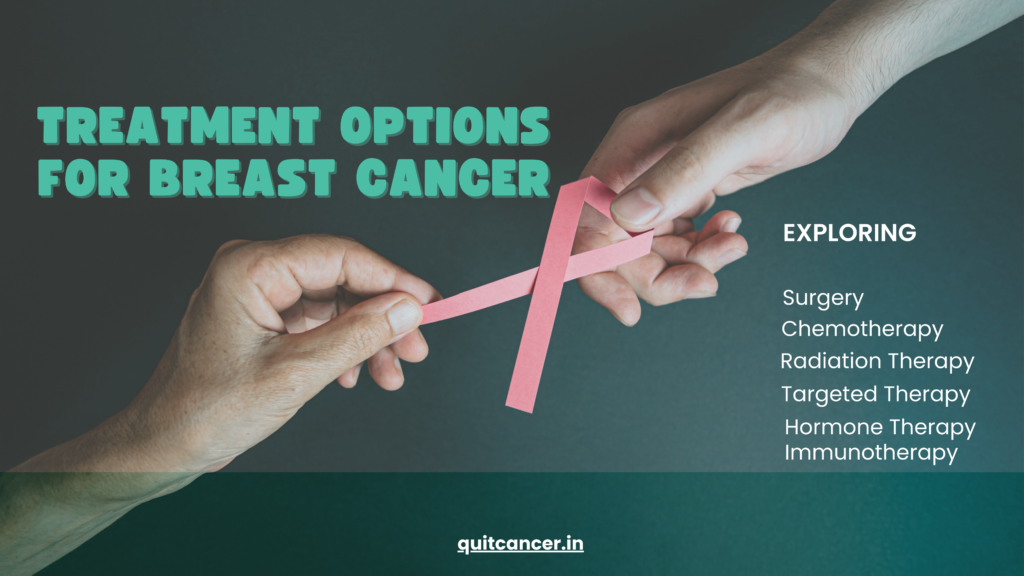
Key Treatment Options for Breast Cancer
When it comes to treating breast cancer, a combination of therapies may be recommended depending on the specific diagnosis. Below, we cover some of the most common and effective treatments used to combat breast cancer.
1. Surgery: Removing Cancerous Tissue
Surgery is often the first step in treating breast cancer. The goal is to remove the tumor or affected tissue to prevent the cancer from spreading. Two main types of surgery are commonly used:
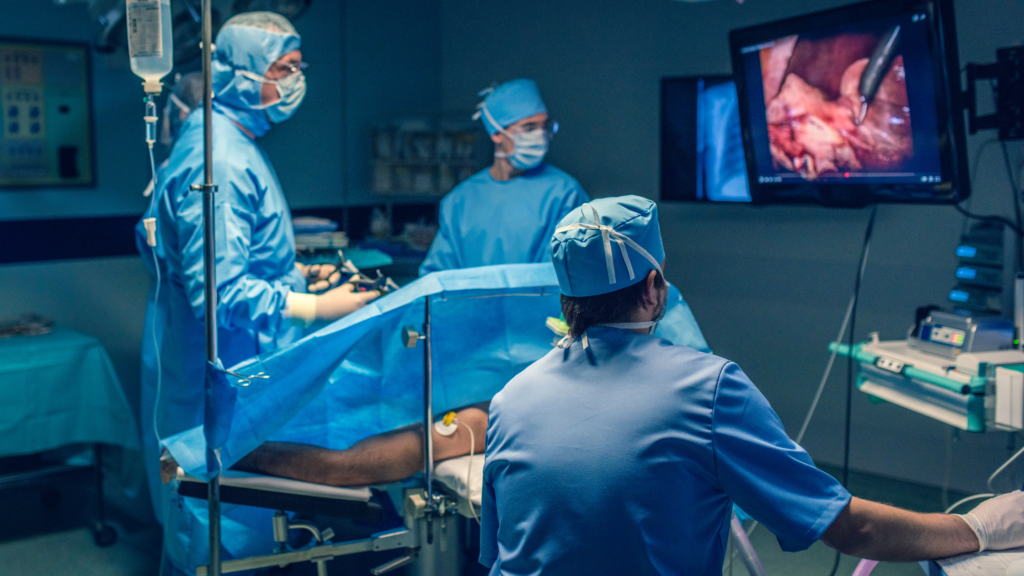
- Lumpectomy: This surgery involves removing the tumor along with a small margin of surrounding healthy tissue. It’s often recommended for early-stage breast cancers and is a less invasive option compared to mastectomy.
- Mastectomy: In cases where the cancer is more widespread or the risk of recurrence is high, a mastectomy may be recommended. This procedure involves removing the entire breast. Sometimes, this is combined with the removal of lymph nodes under the arm to check for signs of cancer spread.
In addition, reconstructive surgery may be considered after a mastectomy, allowing patients to regain their body’s appearance post-surgery.
2. Chemotherapy: Targeting Cancer Cells
Chemotherapy plays a vital role in treating breast cancer, especially when the cancer has spread beyond the breast. This treatment uses powerful drugs to target and kill rapidly growing cancer cells. Chemotherapy is often recommended before surgery (neoadjuvant therapy) to shrink the tumor or after surgery (adjuvant therapy) to eliminate any remaining cancer cells.
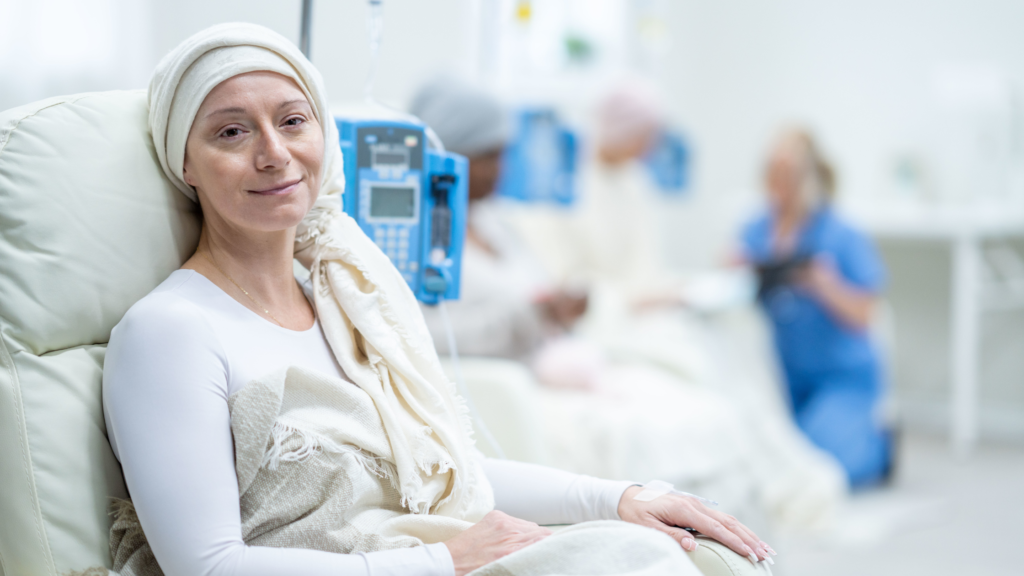
Chemotherapy drugs are typically administered intravenously or in pill form, and the course of treatment usually spans several weeks or months. The specific drugs and treatment plan will depend on the cancer’s characteristics.
3. Radiation Therapy: Destroying Remaining Cancer Cells
Radiation therapy uses high-energy rays to destroy cancer cells that may remain after surgery. It is commonly used after a lumpectomy to ensure that any microscopic cancer cells in the surrounding tissue are eradicated. Radiation may also be applied to areas where the cancer has spread, such as lymph nodes.
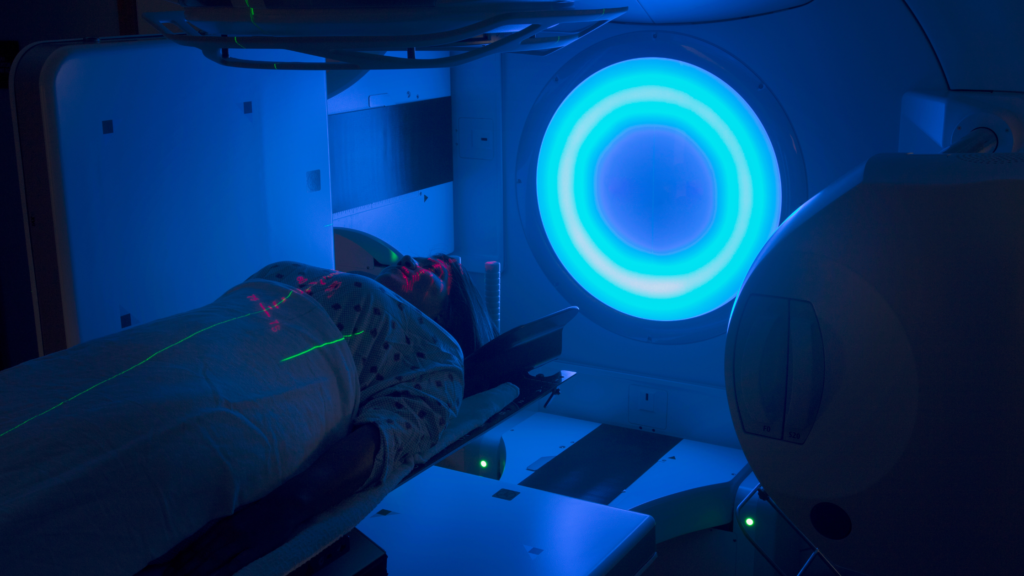
Though radiation is generally well-tolerated, it can cause side effects like fatigue, skin irritation, and changes in breast appearance. These effects usually subside after the completion of treatment.
4. Hormone Therapy: Blocking Hormones that Fuel Cancer
Some types of breast cancer, known as hormone receptor-positive breast cancers, rely on hormones like estrogen and progesterone to grow. Hormone therapy works by blocking these hormones or lowering their levels, making it difficult for the cancer to thrive.

Medications such as tamoxifen, aromatase inhibitors, and others are commonly used in hormone therapy. Hormone therapy can be prescribed for both pre- and post-menopausal women, depending on their age and the type of cancer.
5. Targeted Therapy: Attacking Specific Cancer Cells
Targeted therapy is a more recent advancement in breast cancer treatment. It uses drugs or other substances to target specific molecules involved in cancer growth and spread. This therapy can be used in combination with chemotherapy or on its own, particularly when cancer cells have specific genetic mutations.
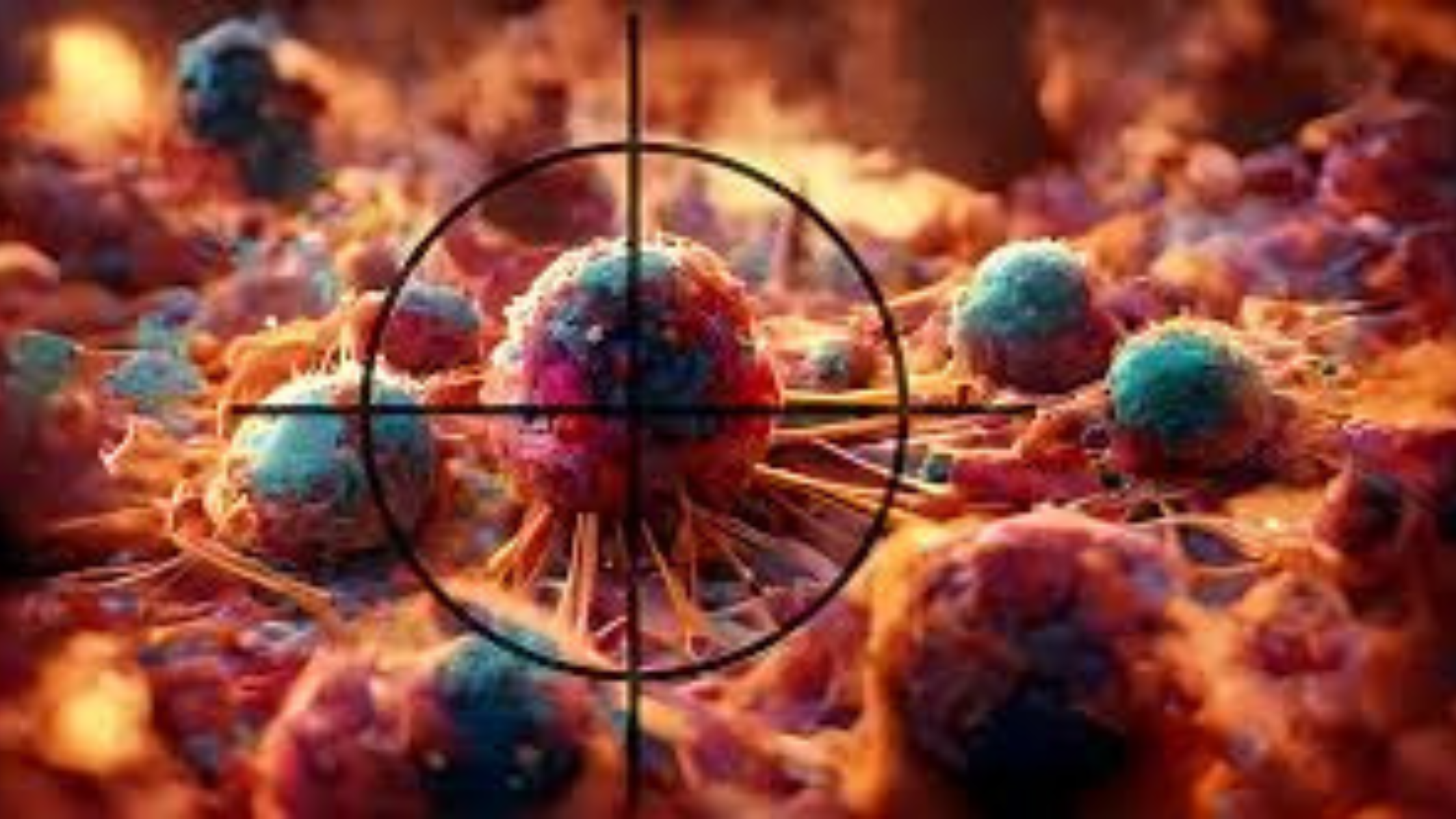
Targeted drugs, such as HER2 inhibitors, are often prescribed for HER2-positive breast cancers, which tend to grow faster and be more aggressive. These therapies aim to block the action of the HER2 protein, which fuels cancer cell growth.
6. Immunotherapy: Boosting the Body’s Natural Defenses
Immunotherapy is an innovative treatment that enhances the body’s immune system to fight cancer more effectively. It is particularly useful for triple-negative breast cancer (TNBC), which does not respond to hormonal therapy or targeted therapy. Immunotherapy helps the immune system recognize and attack cancer cells that may otherwise go unnoticed.

Though still in the experimental phase for many cancers, immunotherapy shows promising results in improving outcomes for patients with advanced or metastatic breast cancer.
Breast Cancer Treatment for Stage 1
Stage 1 breast cancer is considered early-stage and is usually confined to the breast tissue, with no sign of spreading to lymph nodes or distant parts of the body. Treatment for Stage 1 breast cancer is highly effective, and the goal is to remove the tumor completely while minimizing side effects.
Treatment Options for Stage 1 Breast Cancer:
- Surgery: A lumpectomy is the most common surgery for Stage 1 breast cancer, as it allows for the removal of the tumor with minimal tissue damage. In some cases, a mastectomy may be recommended based on patient preference or other risk factors.
- Radiation Therapy: After surgery, radiation is often used to ensure that any remaining cancer cells are destroyed. This is typically recommended after a lumpectomy.
- Chemotherapy: Chemotherapy may not always be required for Stage 1 cancer, especially if the cancer is estrogen receptor-positive. However, it may be used in certain situations, such as if the cancer is large or aggressive.
- Hormone Therapy: If the cancer is hormone receptor-positive, hormone therapy may be recommended to lower the risk of recurrence.
- Targeted Therapy: For HER2-positive cancers, targeted therapy may be used to target the HER2 protein and prevent cancer cell growth.
The prognosis for Stage 1 breast cancer is excellent, with many patients achieving full recovery after treatment.
Breast Cancer Treatment for Stage 2
Stage 2 breast cancer is considered an early to mid-stage cancer, where the tumor is generally larger than in Stage 1 and may have spread to nearby lymph nodes. However, it has not spread to distant areas of the body. Treatment for Stage 2 breast cancer typically involves a combination of surgery, chemotherapy, and possibly radiation therapy, depending on the cancer’s characteristics.
Treatment Options for Stage 2 Breast Cancer:
- Surgery: A lumpectomy may still be an option for many patients with Stage 2 breast cancer, depending on the tumor’s size and location. If the tumor is large or located in an area difficult to access, a mastectomy may be recommended. The goal is to remove the tumor completely and prevent further spread. In addition, lymph nodes may be removed to check for any cancer cells.
- Chemotherapy: Chemotherapy is a critical component of Stage 2 breast cancer treatment. It can be used before surgery (neoadjuvant chemotherapy) to shrink the tumor, making it easier to remove, or after surgery (adjuvant chemotherapy) to destroy any remaining cancer cells and reduce the risk of recurrence. Chemotherapy is typically recommended for tumors that are larger or more aggressive.
- Radiation Therapy: After surgery, radiation therapy is often used to target any remaining cancer cells in the breast or surrounding areas, particularly after a lumpectomy. This helps reduce the chance of the cancer returning in the same area.
- Hormone Therapy: For hormone receptor-positive breast cancers, hormone therapy is recommended to lower estrogen levels or block its effects. This reduces the risk of recurrence and is often used after surgery and chemotherapy.
- Targeted Therapy: If the cancer is HER2-positive, targeted therapy (e.g., trastuzumab or Herceptin) is often used. These therapies specifically target and block the HER2 protein, which can fuel the growth of breast cancer cells. Targeted therapy can be used in combination with chemotherapy or as a standalone treatment in certain cases.
- Immunotherapy: While still considered experimental for some types of breast cancer, immunotherapy may be considered in certain situations, particularly for triple-negative breast cancer (TNBC), which does not respond to hormonal therapy or HER2-targeted therapy. Immunotherapy helps boost the immune system’s ability to fight off cancer cells.
For patients with Stage 2 breast cancer, the treatment plan will be tailored to the specific characteristics of the tumor, including its size, whether it is hormone receptor-positive, HER2-positive, or triple-negative. With timely and appropriate treatment, the prognosis for Stage 2 breast cancer is highly favorable, and many patients go on to achieve long-term survival.
Breast Cancer Treatment for Stage 3
Stage 3 breast cancer is more advanced, with cancer cells having spread to nearby lymph nodes or tissues. Treatment for Stage 3 breast cancer is more aggressive, involving a combination of therapies to shrink the tumor and prevent further spread.
Treatment Options for Stage 3 Breast Cancer:
- Neoadjuvant Chemotherapy: Chemotherapy is often used before surgery to shrink the tumor, making it easier to remove. This is referred to as neoadjuvant chemotherapy and is typically followed by surgery.
- Surgery: A mastectomy is more common for Stage 3 cancers, especially when the tumor is large or has spread to multiple lymph nodes.
- Radiation Therapy: Radiation therapy is essential for Stage 3 breast cancer to target any remaining cancer cells in the lymph nodes or breast area. It is typically recommended after surgery.
- Targeted Therapy: HER2-positive cancers will require HER2-targeted therapy, which can help slow down the spread of the cancer.
- Hormone Therapy: If the cancer is hormone receptor-positive, hormone therapy will be part of the treatment regimen to block the hormones that are fueling cancer growth.
- Immunotherapy: Immunotherapy may be considered for patients with triple-negative breast cancer or for those who do not respond well to traditional therapies.
Though Stage 3 breast cancer is more challenging to treat, advancements in treatment options have significantly improved survival rates, and many patients go on to live long, healthy lives.
Read More: Breast Cancer Symptoms
FAQs
Can you live 20 years after breast cancer treatment?
Yes, many women diagnosed with breast cancer live 20 years or more after treatment, especially if the cancer was caught early and treated aggressively.
Which surgery is better for breast cancer?
The type of surgery depends on various factors such as tumor size, location, and patient preference. Lumpectomy is generally preferred for early-stage cancers, while mastectomy may be necessary for larger or more aggressive tumors.
When an oncologist says no more chemo?
An oncologist may say “no more chemo” when the cancer has become resistant to the chemotherapy drugs, when the patient has reached their maximum tolerable dose, or when the side effects outweigh the benefits of continued treatment.
What is the new breakthrough for breast cancer?
Recent breakthroughs in breast cancer treatment include the development of immunotherapy, targeted therapies, and personalized medicine based on genetic testing. These advancements allow for more tailored and effective treatments.
Conclusion
The treatment options for breast cancer are extensive and tailored to the individual’s needs, considering factors such as cancer stage, type, and personal health. Whether through surgery, chemotherapy, radiation, hormone therapy, or newer treatments like immunotherapy, the medical community continues to improve survival rates and quality of life for breast cancer patients. For those diagnosed with Stage 1 breast cancer, the prognosis is positive, and the treatment is often highly effective. For those with Stage 3 breast cancer, a combination of treatments is required, but many patients go on to live healthy lives after treatment.
By understanding your treatment options, staying informed about new breakthroughs, and discussing your choices with your oncologist, you can take an active role in your breast cancer journey.Dr. Mohit Agarwal, a trusted Breast Cancer Specialist in Delhi, offers personalized treatment options for effective breast cancer care. Consult him for expert guidance and optimal recovery.
